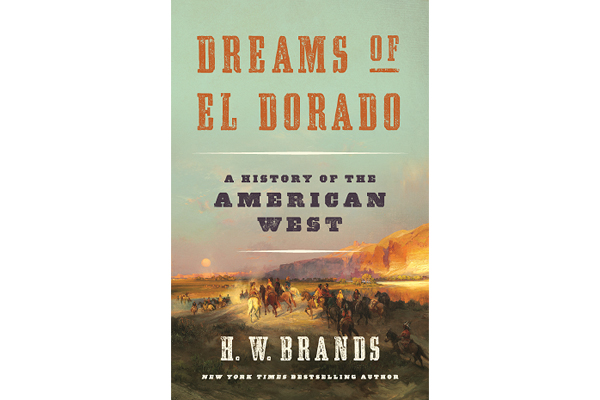H.W. Brands’ sprawling historical account of the American West in the 19th Century, “Dreams of El Dorado,” weaves together diverse stories animating the frontier experience in the rugged western wilderness.
Brands does not set out to speak for the West, but allows the West to speak for itself. Such an approach enlivens classic Western stories and provides opportunities for new voices. Yet the objective, apolitical stance of the book leaves the significance and legacy of the West up for each reader to decide.
Relying on diaries and eyewitness accounts to bring life to the history, Brands focuses on intimate stories of miners, trappers, cowboys and missionaries. These stories guide the narrative through the major touchstone episodes of the Wild West with a novelistic eye for detail.
This approach allows Brands to breathe new life into the familiar stories of the West such as the Gold Rush and the Oregon Trail. In fleshing out the journey of Lewis and Clark, Brands describes how easily the enterprise could have fallen apart due to challenges of starvation, river rapids and standoffs with indigenous groups.
Brands follows one man who grew up among the Comanche, fought in the War of 1812, ventured into politics as a protégé of Andrew Jackson and became a shameless drunkard. Only after sobering up did Sam Houston go on to become the leader of the Texas Revolution. In doing so, Brands effectively demythologizes the legendary figures of the West and reintroduces them once more.
Lesser-known narratives of the West add color to the larger story. The stories of citizen vigilante groups who arrested, tried and executed organized gang members in the early days of San Francisco. With a corrupt police force or none at all, citizens in the West often had to institute their own forms of justice. The term outlaw comes from being outside the reach of law in the West.
In voicing the perspectives of indigenous people and fringe groups, Brands provides a more complex and nuanced portrayal of the West. Brands retells the Battle of the Little Bighorn from the perspective of Black Elk and the Lakota people. In doing so, he is able to show how the Lakota’s victory led to an overwhelming military response that broke the back of indigenous resistance.
Keeping an objective viewpoint, Brands strives to not make judgments on the individuals and peoples of the West. While Stephen F. Austin may have pushed for the freedom of Texans, he also used loopholes to allow slavery in the state after Mexico abolished the practice. In writing about both dimensions, Brands resists the simple and accommodating narratives that patriotic histories provide.
But only in a few instances does Brands connect his history to events beyond the period in which it is set. Lacking those connections to today’s time, the book exists as a largely insular portrait of the West. The desire of Brands to remain apolitical leads him to forgo articulating the larger legacies of the frontier experience.
The lack of a larger argument behind the history may leave readers wanting. But perhaps, given how much of Western history was rewritten to serve various ideologies, Brands allows the historical events and people of the time speak for themselves without revision.
Rating: 4 out 5 stars





















